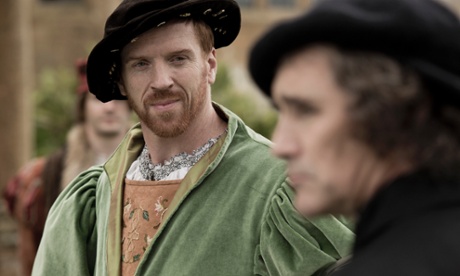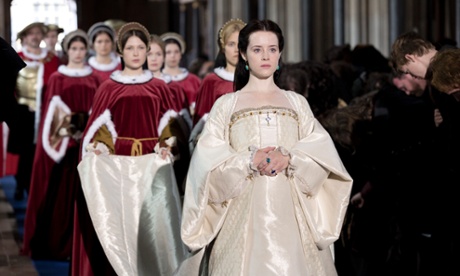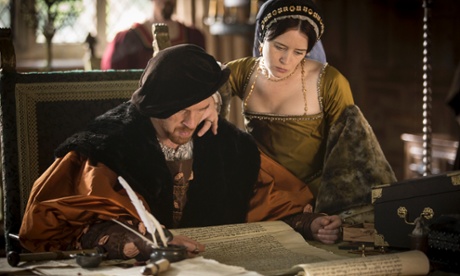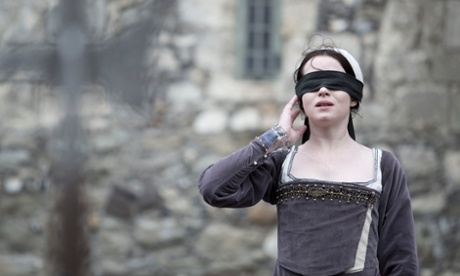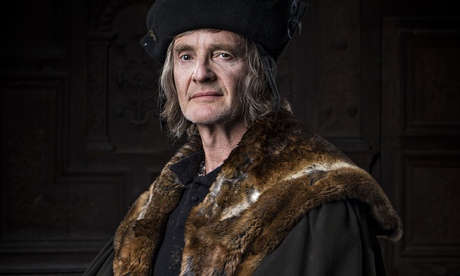Spoiler alert: This blog contains spoilers for episode two of Wolf Hall.
Read John Sutherland’s episode one recap.
How to describe the viewing nation’s response to the first instalment? Mania. With the second and third instalment of a series, the response tends to cool down. It is easier to think critically because this second part is slow. Not dull, or slack, but with the quiet intensities of pieces being moved on a chess-board. The central characters are getting themselves into position around the big event – Wolsey’s death.
But what, precisely, is Cromwell positioning himself for? What motives and emotions are there behind that inscrutable Rylanceian mask? Personal ambition? Lust for power? Lust pure and simple? (He transgresses the degrees of incest, strict Catholics would believe, by beginning an affair with his deceased wife Liz’s sister, Johane). Revenge for the humiliations heaped on his beloved Cardinal, and against Norfolk who publicly and persistently insults him?
Everything is obscure – even more so thanks to the candle-powered illumination that director Peter Kosminsky has artfully chosen. Cromwell is always lurking, barely visible, on the edge of things: dressed in black. His son, Gregory (gradually being inserted into the plot), says that only burglars have black dogs. They can’t be seen at night, when they do their dirty work. It raises a rare smile on his father’s face.
The episode opens in December 1529. Days are short, cold and overcast. In a windy corridor, Cromwell waits, hour after freezing hour, to petition the king on Wolsey’s behalf. The King brushes him off: he can do nothing, he says in an undertone (who now controls Henry? Anne?). Smeaton, the first rat to leave the sinking Wolsey ship and now a bishop in the king’s retinue, smirkingly insults Thomas.
Another, even humbler petition to the king yields Cromwell £1,000 pounds (“the best I can do”). Petty cash. But it’s enough to get the importunate cleric out of the way. Cromwell prepares Wolsey, a dying man, for his exile in his northern archbishopric. Neither of them has ever been to that far-off place. He does not accompany his master (still?), or visit him. He does send up some quails: yorkshire pudding is not to the archbishop’s taste. Has Cromwell remained in London to intercede with the King or is he gradually detaching himself? He will soon be a free agent.
Wolsey, as crowds swell his progress north testify, is still, like Rome, too popular with the people. An arch-enemy, Harry Percy, whose marriage with Anne was obstructed by Wolsey, is sent to bring him back, brutally, to the Tower on a charge of high treason. The cardinal dies on route, sparing the axeman his grisly duty. Thomas’s name is on his dying lips. But Thomas is not at his deathbed. In a garden scene, he outshoots Henry in an archery competition. Dangerous, one would have thought. But Cromwell, the card sharper, plays a subtle game.
As they wander the Hampton maze, he entices the king by suggesting how he (Cromwell) might raise tax revenues. Go for the fat corrupt monks and their monasteries. He is employed (“Sit down with my lawyers”). Cromwell is now an insider. At home, in Austin Friars, he embarks on his quasi-incestuous affair with Johane. Like everything else he does, it will be kept a secret from the world. He comes close to starting another affair with Anne’s slighted sister, Mary Boleyn. But that would be too dangerous. You see the thought flashing, momentarily, across his face. Johane is safe – she’s on the payroll.
Wolsey’s funeral, in which he is dispatched to his maker in a plain wooden box, no monument, is the final, calculated, insult. He is mocked in a masque at court as now the supreme cardinal in Hell. Henry laughs uproariously. The last words in the instalment are Thomas’s promise that he will “take it in hand”: God need not be bothered. Men such as Cromwell always eat their revenge cold.
Everything in Kosminsky’s drama is seen from Cromwell’s point of view, the “camcorder in the head” technique Hilary Mantel devised for her novel. But what is going on in that head? Occasionally, the Cromwellian visor lifts. He finds his cat has littered under his bed, and cuddles a mewing black kitten. Another rare smile.
Pets are thematic in this instalment. Gregory has a brace of white hunting dogs. They kill cats, he says, ominously (watch that boy). Wolsey nurses a rabbit. One of his retinue says, privately, that he would like to see it in a stew. Historically, More had a monkey: Kosminsky evidently thought that was a pet too far.
The thing about pets is that you are their master. “One thing I will give you,” says Henry to Cromwell, “You stick by your master”. He adds, pointedly: “But you have another master.” Cromwell’s face suggests he is no one’s pet.
One thing is clear. He is gathering information for his power struggle with Mistress Boleyn. He has “noted” the lutenist (Mark Smeaton) and the poet Thomas Wyatt – reputed to be her lovers. His bigger game is the King. In the most surprising scene of this episode, Cromwell is summoned in the small hours (arrest? His household fears) to the royal bedroom at Greenwich. Henry, in his nightgown, has had a nightmare. His older brother, the true-born king, has returned from the grave to glare balefully at him. Cromwell, always at his best at bedsides, soothes the monarch. Another strategic move on the board. The king’s chaplain, Thomas Cranmer, flutters, uselessly.
Once Cromwell has the ear and trust of the King, what next? The “King’s Great Matter”, The Englishing of England. The name “Tyndale” keeps cropping up. His Bible will be instrumental in that Englishing.
Thoughts and observations
- Peter Straughan, who wrote the script and screenplay, has been commendably faithful to Mantel while infusing new televisual life into the narrative. He has modestly described the difficulty of doing that.
- Rylance is one of the best actors of our time. But he is rarely seen on large or small screen. Stage is where he is happiest. It’s an astute casting choice – he throws no confusing shadows of past performances to distract the viewer. It’s an effort not to watch Damian Lewis without thinking, irrelevantly, of Nick Brody.
- Again on casting issues, a small cavil. Historically, Cromwell was 44 in 1529. Rylance is 55 and plays the part his own age. Wolsey was 57 in 1592. Jonathan Pryce is 67 and plays the Cardinal like a man awaiting Henry VIII’s telegram on his 100th birthday. Should these characters not be played their true historical age?
- It’s a hugely crowded plot. Mark Gatiss, for example, a big-name actor, has to put a character together in a couple of short clips and sneers. Would not the more ample, two-hour, dimensions of Foyle’s War, or Endeavour, have been the best choice.
- A small observation. I asked my dentist if the universally good teeth in the cast were unhistorical. No, he said. The mass importation of processed sugar is what did the damage. Skeletal evidence reveals that in the 16th century teeth were healthier than ours. Getting them knocked out (in a more personally violent society than ours) was the major risk. Mantel’s Cromwell would have lost a few to his father’s abuse, one imagines.


